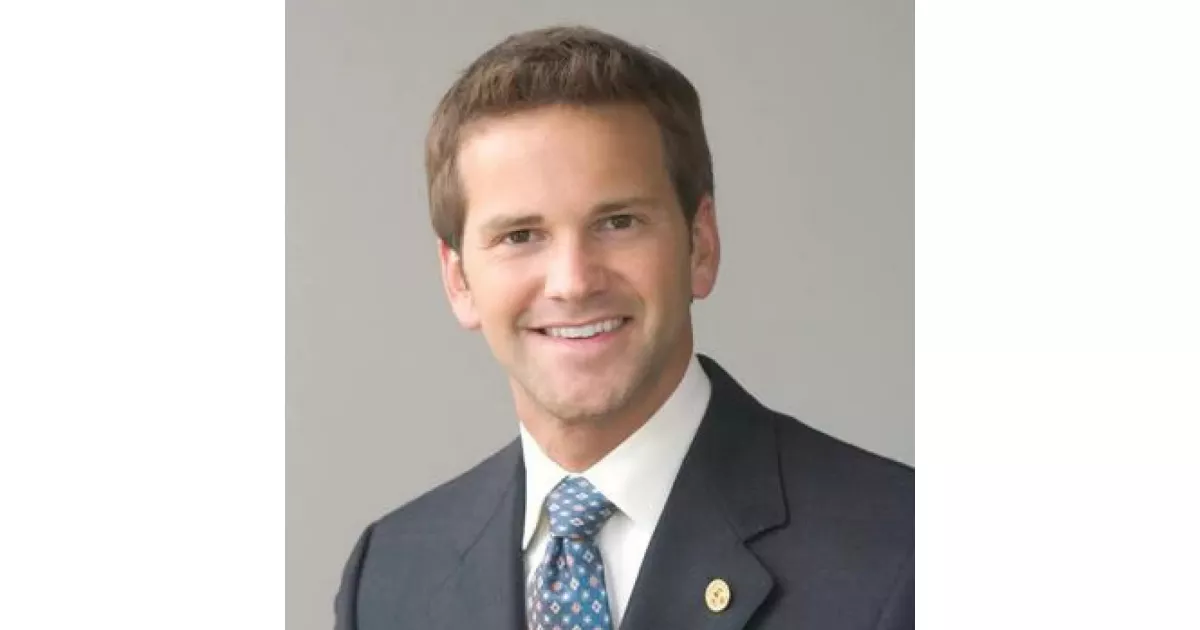Aaron Jon Schock, a former U.S. Representative for Illinois's 18th congressional district, served from 2009 to 2015. Notably, he was the first millennial and youngest member of Congress, assuming office at 27. Prior to his congressional role, he served two terms in the Illinois House of Representatives, also as its youngest member.
1933: Previous Representatives of the 18th District
Since 1933, only five people, including Aaron Schock, had served as the U.S. Representative for Illinois's 18th Congressional District.
May 28, 1981: Birth of Aaron Schock
Aaron Jon Schock was born on May 28, 1981, in Morris, Minnesota.
1995: Elected to Student Council Board
In 1995, Aaron Schock was elected to the executive board of the Illinois Association of Junior High Student Councils.
2000: Schock Graduates High School Early
In 2000, Aaron Schock graduated from Richwoods High School after attending Illinois Central College for college credit due to limited course options at his high school.
2002: Schock Graduates from Bradley University
Aaron Schock graduated from Bradley University with a Bachelor of Science degree in finance in 2002.
July 2, 2003: Schock Elected School Board Vice President
On July 2, 2003, Aaron Schock was elected vice president of the school board in a 4-3 vote.
July 2, 2004: Schock Becomes Youngest School Board President in Illinois History
On July 2, 2004, Aaron Schock was unanimously elected as school board president at the age of 23, making him the youngest person to hold that position in Illinois history.
November 2004: Schock Elected to Illinois House of Representatives
In November 2004, at the age of 23, Aaron Schock was elected to the Illinois House of Representatives, becoming the youngest member in state history after defeating four-term incumbent Democrat Ricca Slone.
2004: Schock Sells Business
In 2004, Aaron Schock sold his Garage Tek franchise before running for state representative.
2004: Media Questions Schock's Sexual Orientation
Starting in 2004, media outlets began questioning Schock's sexual orientation, contrasting it with his socially conservative voting record.
2006: Schock Re-elected to Illinois House
Aaron Schock was re-elected to the Illinois House of Representatives in 2006, defeating Democrat Bill Spears with 58% of the vote.
2007: Schock's History of Questionable Mileage Reimbursements
An investigation revealed that Schock had a pattern of questionable mileage reimbursements dating back to 2007 when he purchased a GMC Envoy. Discrepancies were found between the mileage he billed for and the actual miles driven, suggesting a history of potential abuse of funds.
February 2008: Schock Wins Republican Primary
Aaron Schock won the Republican primary for Illinois's 18th congressional district in February 2008 with 72% of the vote, defeating Jim McConoughey and John Morris.
July 2008: Controversy over Bush Fundraiser Costs
In July 2008, Aaron Schock faced criticism for a fundraiser he held in Peoria for President George W. Bush. The city incurred costs for security and logistics, leading to debate about whether Schock should reimburse the city. Initially resistant, Schock eventually agreed to reimburse the city.
October 2008: Schock's Father Testifies About Notary Issue
During October 2008, Aaron Schock's father provided testimony in federal court that his son had notarized documents with inaccurate dates while helping his parents set up tax shelters, a Class A misdemeanor under Illinois law.
October 2008: Emergency Economic Stabilization Act Passed
The Emergency Economic Stabilization Act of 2008, commonly known as the financial bailout plan, was passed by Congress in October 2008. Schock has stated he would have supported the plan.
November 4, 2008: Schock Elected to Congress
Aaron Schock won the general election on November 4, 2008, with 59% of the vote, defeating Democrat Colleen Callahan and Green Party candidate Sheldon Schafer, to become the U.S. Representative for Illinois's 18th congressional district.
November 2008: Jehan Gordon Wins Schock's Former Seat
Democrat Jehan A. Gordon won the election for Aaron Schock's former seat (92nd Representative District) in the Illinois House of Representatives in November 2008.
2008: Schock Speaks at Republican National Convention
Aaron Schock was chosen to speak at the 2008 Republican National Convention.
2008: John McCain's Hypothetical Victory in Redistricted District
Following redistricting, Schock's district became significantly safer for Republicans. Analysis suggested that if the redistricted 18th district had existed in 2008, John McCain would have won with 60.7% of the vote.
January 9, 2009: Voted Against Employment Discrimination Law Amendment
Schock voted against the Employment Discrimination Law Amendment (H.R. 11 and H.R. 12) on January 9, 2009.
January 2009: Scrutiny of Schock's Spending Begins
Media scrutiny of Schock's spending began in January 2009 when reports emerged of his lavish office decorations and renovations funded by government money.
February 2009: Voted Against Stimulus Plan
In February 2009, Aaron Schock voted against the $787 billion stimulus plan.
February 2009: Schock Garners Attention for Looks, Draws Media Scrutiny
In February 2009, Schock gained notoriety for being named "hottest freshman" congressman in a Huffington Post poll. This marked the beginning of frequent media attention, particularly from outlets like TMZ, which Schock believed could increase voter engagement, even if it focused on his lifestyle rather than legislative work.
February 2009: Schock Flies with President Obama
President Obama invited Schock to fly on Air Force One in February 2009 for a visit to a Caterpillar plant in East Peoria, Illinois. During the visit, Obama attempted to persuade Schock to support the $787 billion stimulus bill. However, Schock ultimately voted against it.
June 28, 2009: Honduran President Removed from Office
On June 28, 2009, Honduran President Manuel Zelaya was removed from office and expatriated during the 2009 Honduran constitutional crisis.
August 2009: Law Library of Congress Issued Legal Opinion on Honduras
In August 2009, the Law Library of Congress released a disputed legal opinion, commissioned by Schock, analyzing the legality of Honduran President Manuel Zelaya's removal from office in June 2009.
November 29, 2009: Honduran Elections
Honduras held elections on November 29, 2009, following the removal of President Manuel Zelaya.
December 15, 2009: Expressed Views on Torture Techniques
On December 15, 2009, Schock stated on Hardball with Chris Matthews that he didn't believe in limiting waterboarding or other torture techniques if they could save American lives in extreme situations, though he didn't believe they should be standard practice.
2009: Schock Becomes Youngest Member of Congress
In 2009, Aaron Schock became the youngest member of Congress at the time, representing Illinois's 18th congressional district. He was the first person born in the 1980s to serve in Congress.
2009: Schock Denies Being Gay
In 2009, Schock publicly denied being gay in an interview with Details magazine, responding to ongoing media speculation about his sexual orientation.
2009: Voted for Illinois and Mississippi Rivers Funding
In 2009, Schock voted to secure $23 million for the restoration and conservation of the Illinois and Mississippi Rivers.
2009: Schock's Mileage Reimbursement Practices Raise Red Flags
In 2009, while still in the state house, Schock's mileage reimbursements for his GMC Envoy showed discrepancies, with him billing for more miles than the odometer readings supported. This pattern of irregularities raised concerns about his use of funds.
2009: Schock's Colbert Report Appearance Plays on Public Persona
Schock appeared on "The Colbert Report" in 2009, where the host, Stephen Colbert, poked fun at his media image, particularly the attention given to his physical appearance.
2009: Schock's Amendment to Troubled Asset Relief Program
Two weeks into his term, Schock proposed a successful amendment to the Troubled Asset Relief Program Accountability Act. This amendment mandated a searchable website for public tracking of bailout fund spending.
January 2010: Schock's Mileage Reimbursements Come Under Scrutiny
In January 2010, Schock began claiming mileage reimbursements for his personal vehicle, a Chevrolet Tahoe. This would later become a point of contention as discrepancies arose between his claims and the vehicle's recorded mileage.
April 2010: Named in Top Ten for Renewable Energy Support
Biofuels Digest named Congressman Aaron Schock #8 in their top ten list of individuals supporting renewable energy in April 2010.
July 2010: Bill Selected for Reducing Government Spending
In July 2010, Schock's bill was chosen as a winning proposal in a Republican effort to reduce government spending.
November 2010: Schock Re-elected to Congress
Aaron Schock won re-election to Congress in November 2010, defeating Democrat D.K. Hirner and Green Party candidate Sheldon Schafer with 59% of the vote.
December 2010: Voted Against Repeal of "Don't Ask, Don't Tell"
Schock voted against repealing the military's "Don't Ask, Don't Tell" policy in December 2010.
2010: Schock's Legislative Success and Funding for Illinois
By the end of his first year in Congress, Schock had passed more legislation than any other Republican freshman. In 2010, he secured $40.7 million in funding for Illinois.
2010: Voted Against Affordable Care Act
In 2010, Aaron Schock voted against the Patient Protection and Affordable Care Act.
2010: Redistricting After the Census
Redistricting occurred in 2010 following the census, leading to significant changes in congressional district boundaries.
2010: Schock's Top Chef Appearance Reinforces Media Presence
Schock's appearance as a guest judge on the reality show "Top Chef" in 2010 further solidified his presence in popular media, highlighting his interest in maintaining a high public profile.
2010: Repeal of "Don't Ask, Don't Tell"
The "Don't Ask, Don't Tell" policy, which barred openly gay individuals from serving in the military, was repealed in 2010. Schock did not support the repeal.
2010: Journal Star Endorses Schock
The Journal Star endorsed Schock in 2010, praising his influence and work ethic, noting his conservative stance, but acknowledging his independent thinking.
January 2011: Introduced Legislation to Deny Funds for Detainee Transfer
Schock introduced legislation with Senator Mark Kirk in January 2011 to block federal funding for transferring detainees from Guantanamo Bay to the United States.
February 2011: Voted Against Defunding National Endowment for the Arts
In February 2011, Schock was one of 23 Republicans who voted against cutting funding for the National Endowment for the Arts.
February 19, 2011: Banned Funding for Stimulus Signs
During a debate on February 19, 2011, Schock successfully banned further funding for stimulus signs highlighting stimulus-related projects.
March 2011: Co-sponsored "A Roadmap for America's Energy Future"
In March 2011, Schock co-sponsored "A Roadmap for America's Energy future" (H.R. 909), a plan promoting the production of various domestic energy supplies, introduced by Republican Congressman Devin Nunes.
April 10, 2011: Proposed Legislation for Federal Program Sunset Commission
On April 10, 2011, Aaron Schock introduced legislation to create the Federal Program Sunset Commission, aiming to abolish unnecessary or underperforming federal programs.
June 2011: Schock's Media Appearances Highlight Image over Substance
Schock's appearance on the cover of Men's Health magazine in June 2011 further fueled criticism that he was more focused on cultivating a public image than on his legislative duties.
September 2011: Introduced Help Veterans Own Franchises Act
Schock and Democrat Leonard Boswell introduced the Help Veterans Own Franchises Act in September 2011 to provide tax credits for veteran-owned franchises.
2011: Appointed to the Ways and Means Committee
At the start of his second term in 2011, Schock was appointed to the Ways and Means Committee, serving on subcommittees for Trade, Social Security, and Oversight.
2011: Supported Free-Trade Agreements
In 2011, Schock supported free-trade agreements with Colombia, Panama, and South Korea, which were passed by the House.
2011: Co-sponsored Bill to Fund Highway Construction
Schock and John Carney co-sponsored a bill in 2011 to use U.S. oil exploration funds for a five-year federal highway construction project.
February 2012: Darrel Miller Removed from Ballot
In February 2012, Darrel Miller, who was initially expected to run against Schock in the Republican primary, was removed from the ballot due to issues with his petition signatures.
April 2012: No Longer a Member of the Republican Study Committee
As of April 2012, Schock was no longer a member of the Republican Study Committee, which he joined in his first term.
April 2012: Co-sponsored Highway Construction Bill
As of April 2012, a bill co-sponsored by Schock and Democrat John Carney in 2011, proposing to use U.S. oil exploration funds for a highway construction project, hadn't been voted on.
April 2012: Help Veterans Own Franchises Act in Committee
As of April 2012, the Help Veterans Own Franchises Act, introduced by Schock and Leonard Boswell, was still in committee.
April 2012: FEC Complaint Filed Against Schock
Watchdog groups filed a complaint with the Federal Election Commission in April 2012, alleging Schock violated campaign finance rules by soliciting a $25,000 donation from House Majority Leader Eric Cantor for a Republican primary.
July 19, 2012: Voted for House Amendment 1416
Schock voted for House Amendment 1416 on July 19, 2012, which prohibited the use of funds that contradicted the Defense of Marriage Act.
November 6, 2012: Schock Re-elected to Congress
Schock won re-election for his congressional seat on November 6, 2012, with 74% of the vote, defeating Democrat Steve Waterworth.
November 2012: Schock Explores Run for Governor
Following the 2012 election, Schock reportedly met with the Republican Governors Association to discuss a potential gubernatorial bid in 2014.
December 2012: House Ethics Committee Investigates Schock
The House Committee on Ethics confirmed in December 2012 that the Office of Congressional Ethics had referred a matter concerning Schock to them for review.
2012: Schock Endorses Mitt Romney
During the 2012 Republican presidential primaries, Schock endorsed Mitt Romney and made appearances with him at campaign events.
2012: Schock's Views on Getting Attention
In 2012, Schock shared his belief that getting people's attention is crucial for political influence, arguing that recognition is necessary for people to listen to one's message.
2012: Ethics Complaint Regarding Real Estate Transaction
Schock faced an ethics complaint regarding the sale of his Peoria home to a major Republican donor for a price allegedly exceeding market value, prompting scrutiny from Citizens for Responsibility and Ethics in Washington.
2012: Voted for National Defense Authorization Act
Schock voted for the National Defense Authorization Act for Fiscal Year 2012.
February 2013: Office of Congressional Ethics Report Released
The Office of Congressional Ethics released a report in February 2013 stating there was substantial reason to believe Schock had violated federal law and House rules related to campaign finance.
February 28, 2013: Schock Reintroduces New Philadelphia, Illinois, Study Act
Schock reintroduced the New Philadelphia, Illinois, Study Act on February 28, 2013. The bill aimed to study the New Philadelphia archaeological site's national significance and assess making it part of the National Park System.
April 2013: Schock Announces Re-election Bid
Schock announced in April 2013 that he would seek a fourth term in Congress, foregoing a run for Governor of Illinois.
April 29, 2013: Schock and Keating Introduce Equitable Access to Care and Health Act
On April 29, 2013, Schock, alongside Rep. William R. Keating, introduced the Equitable Access to Care and Health Act. The bill proposed amending the Internal Revenue Code to provide an additional religious exemption from the Affordable Care Act's minimum essential health care coverage requirements.
May 2013: Time Magazine Poll Nomination
In May 2013, Aaron Schock was nominated for a Time magazine poll titled "Who's the Most Influential Millennial?"
December 2013: Schock Leads Congressional Delegation to Mandela's Funeral
House Speaker John Boehner chose Schock to head the congressional delegation attending Nelson Mandela's funeral in December 2013.
2013: Introduced Higher Education and Skills Obtainment Act
Schock and Senator Marco Rubio introduced the Higher Education and Skills Obtainment Act in 2013, aiming to restrict eligibility for certain higher education tax credits.
July 2014: Discrepancies in Schock's Mileage Claims Emerge
By July 2014, when Schock transferred his Chevrolet Tahoe back to the dealer, documents revealed a significant discrepancy between his claimed mileage reimbursements and the vehicle's actual mileage, raising suspicions of improper claims.
November 2014: Schock Wins Re-election
Schock won the November 2014 general election with 75% of the vote, defeating Democrat Darrel Miller.
2014: Schock's Spending Habits Draw Increased Attention
In 2014, media reports continued to surface, raising concerns about Schock's spending habits, particularly regarding his use of government funds.
2014: Potential Gubernatorial Election
The 2014 election cycle included the race for Governor of Illinois.
February 2015: Downton Abbey Office Decor Sparks Controversy
In February 2015, news broke that Aaron Schock had used government funds to redecorate his office in a lavish style inspired by "Downton Abbey." The watchdog group CREW filed a complaint, alleging an improper gift, while Schock dismissed criticisms with the phrase "Haters gonna hate." He later agreed to pay the decorator but faced further scrutiny over his spending habits.
March 2015: Schock Faces Mounting Criticism and Calls for Resignation
By March 2015, revelations of Schock's spending irregularities and potential ethics violations led to widespread criticism and calls for his resignation from conservative commentators and media outlets.
March 2015: Schock Resigns Amid Scandal
In March 2015, Aaron Schock resigned from Congress due to a scandal involving his use of public and campaign funds for lavish trips and events.
March 17, 2015: Schock Announces Resignation from Congress
On March 17, 2015, facing mounting pressure and scrutiny over his spending, Schock announced his resignation from Congress, effective immediately.
March 31, 2015: Schock's Resignation Becomes Effective
Schock's resignation from Congress became effective on March 31, 2015, marking the end of his tenure amid a cloud of controversy.
2015: Schock Resigns from Congress
Aaron Schock resigned from his position as U.S. Representative for Illinois's 18th congressional district in 2015 amidst a scandal regarding his use of public and campaign funds.
2015: Schock's Spending Scandal Deepens
In 2015, Politico reported that Schock had charged thousands of dollars for personal expenses to his government account, including private flights, entertainment, and luxury items, further fueling the controversy surrounding his spending habits.
2015: Voted to Repeal Affordable Care Act for the 56th Time
Schock voted to repeal the Affordable Care Act in 2015, marking the 56th time the act had been voted on for repeal without a replacement, drawing criticism from the Peoria Journal Star.
October 2016: Schock Faces FEC Penalty for Campaign Finance Violation
In October 2016, Schock agreed to pay a $10,000 civil penalty to the Federal Election Commission (FEC) for campaign finance violations related to improper solicitation of funds.
November 10, 2016: Schock Indicted on Federal Corruption Charges
On November 10, 2016, a federal grand jury indicted Schock on 24 criminal counts, including theft of government funds, fraud, and making false statements, stemming from the spending scandal that led to his resignation from Congress.
November 2016: Federal Grand Jury Indicts Schock
In November 2016, a federal grand jury indicted Aaron Schock in connection with the scandal surrounding his use of public and campaign funds.
December 12, 2016: Schock Pleads Not Guilty to All Charges
Schock appeared in court on December 12, 2016, to enter a plea of not guilty to all 24 federal corruption charges against him, setting the stage for a legal battle.
March 2017: Schock's Legal Team Challenges FBI Tactics
Schock's attorneys, in March 2017, filed court documents alleging misconduct by an FBI informant who was a former staffer, aiming to discredit the government's case.
May 19, 2017: New Trial Date Set for Schock
On May 19, 2017, Judge Colin S. Bruce rescheduled Schock's trial to January 22, 2018, following a series of delays and legal motions.
July 11, 2017: Initial Trial Date Set for Schock
Initially, Schock's trial was scheduled for July 11, 2017, but the date was later postponed due to various legal maneuvers and developments in the case.
October 23, 2017: Two Charges Against Schock Dismissed
In a partial victory for Schock, Judge Bruce dismissed two of the 24 counts against him on October 23, 2017, while denying a motion to dismiss the entire indictment.
November 2017: Schock's Trial Further Delayed
The corruption trial of Aaron Schock faced further delays in November 2017, pushing back the date for the legal proceedings to commence.
January 22, 2018: Trial Postponed Again
The January 22, 2018, trial date for Schock was again postponed, further delaying the resolution of the corruption charges against him.
May 30, 2018: Seventh Circuit Court Upholds Denial of Schock's Motion
The Seventh Circuit Court of Appeals, on May 30, 2018, upheld the lower court's decision to deny Schock's motion to dismiss the entire indictment, paving the way for the case to proceed.
June 26, 2018: Prosecution Team Experiences Shake-Up
In June 2018, Assistant U.S. Attorney Timothy Bass was removed from the Schock case, marking a significant development in the prosecution team's handling of the case.
August 2018: Judge Removed from Schock's Case
In August 2018, Judge Bruce, initially assigned to Schock's case, was removed from all his criminal cases due to unrelated comments made in emails, prompting the case's transfer to Judge Matthew Kennelly.
August 30, 2018: Judge Change and New Prosecution Team
Further changes occurred in August 2018, with Judge Bruce being recused and replaced by Judge Matthew Kennelly. Additionally, the Department of Justice replaced the entire prosecution team, bringing in attorneys from outside the Central District of Illinois.
March 2019: Schock Case Suspended, Charges Dropped After Probation Period
In March 2019, prosecutors and Schock reached an agreement to suspend the case for six months with court supervision. Schock agreed to pay $42,000 to the IRS and $68,000 to his campaign fund. Upon successful completion of probation in September 2019, all charges against him were dropped. His campaign committee pleaded guilty to a misdemeanor for improper expense reporting.
March 2019: Deferred Prosecution Agreement Reached
In March 2019, prosecutors reached a deferred prosecution agreement with Aaron Schock, dropping all charges against him in exchange for good behavior, $100,000 in restitution, and a guilty plea from his campaign committee for improper expense reporting.
April 2019: Schock Photographed at Coachella
In April 2019, Schock was photographed and videotaped at Coachella, engaging affectionately with men, which sparked further controversy due to his past voting record against gay rights.
June 2019: Schock Tipping a Go-Go Dancer
A video surfaced in June 2019 showing Schock tipping a male go-go dancer at a gay bar in Mexico City, fueling further controversy and criticism from gay rights activists.
September 2019: Charges Against Schock Dropped
All charges against Schock were dropped in September 2019 after he successfully completed the terms of his probation, including paying restitution to the IRS and his campaign fund. This marked the end of his legal troubles, albeit with his reputation tarnished.
October 2019: Schock at a Gay Dance Party
Schock was seen and photographed at a gay dance party in Los Angeles in October 2019, drawing further condemnation for his perceived hypocrisy.
March 5, 2020: Schock Comes Out as Gay
On March 5, 2020, Schock publicly came out as gay on Instagram and his website, expressing regret for his past political stances and attributing them to his struggle with his sexual orientation and family pressure.
March 2020: Schock Comes Out as Gay
Despite a history of opposing LGBTQ rights, Aaron Schock publicly came out as gay in March 2020 and expressed regret for some of his past political decisions.
2020: Schock's Continued Involvement in Community Organizations
Even after leaving Congress, Aaron Schock continued to be involved with various organizations, including Youth for a Cause, Peoria Mayor's Vision 2020, the Peoria Chamber of Commerce, Heart of Illinois Kids Count, St. Jude Telethon V.I.P., and medical mission trips.
Mentioned in this timeline

Instagram is a photo and video-sharing social networking service owned...

Marco Rubio is an American politician attorney and diplomat He...
Facebook is a social media and networking service created in...

George W Bush the rd U S President - is...
The Affordable Care Act ACA also known as Obamacare is...

Stephen Colbert is an American comedian writer producer political commentator...
Trending

15 minutes ago Ben Sasse Discusses Mortality, Gospel, and Politics in Recent Discussions and Reflections.

15 minutes ago Dan Ariely's Epstein Ties Surface, Raising Questions About Dishonesty Research, File Disclosure.

1 hour ago Liza Minnelli Claims Oscars Forced Wheelchair Use During Lady Gaga Presentation.
1 day ago Maryland and Virginia Brace for Heavy Snow Risk This Weekend Amidst Uncertainty
2 hours ago Ramadan 2026: Bay Area Iftar & Suhoor Guide, Fasting Rules & Saudi Confirmation.
4 hours ago Greenland's Ice Churning: Scientists Discover Molten Rock-like Activity Underneath the Ice Sheet.
Popular

Jesse Jackson is an American civil rights activist politician and...
Randall Adam Fine is an American politician a Republican who...

Ken Paxton is an American politician and lawyer serving as...

Barack Obama the th U S President - was the...

Bernie Sanders is a prominent American politician currently serving as...
WWE Raw a professional wrestling television program by WWE airs...
